现代大学英语精读5课文译文V_10
大学英语精读5课文翻译
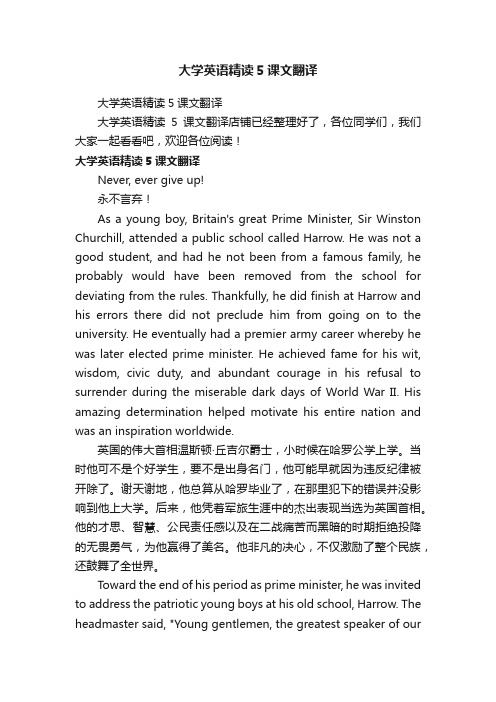
大学英语精读5课文翻译大学英语精读5课文翻译大学英语精读5课文翻译店铺已经整理好了,各位同学们,我们大家一起看看吧,欢迎各位阅读!大学英语精读5课文翻译Never, ever give up!永不言弃!As a young boy, Britain's great Prime Minister, Sir Winston Churchill, attended a public school called Harrow. He was not a good student, and had he not been from a famous family, he probably would have been removed from the school for deviating from the rules. Thankfully, he did finish at Harrow and his errors there did not preclude him from going on to the university. He eventually had a premier army career whereby he was later elected prime minister. He achieved fame for his wit, wisdom, civic duty, and abundant courage in his refusal to surrender during the miserable dark days of World War II. His amazing determination helped motivate his entire nation and was an inspiration worldwide.英国的伟大首相温斯顿·丘吉尔爵士,小时候在哈罗公学上学。
(完整word版)现代大学英语精读5课后翻译
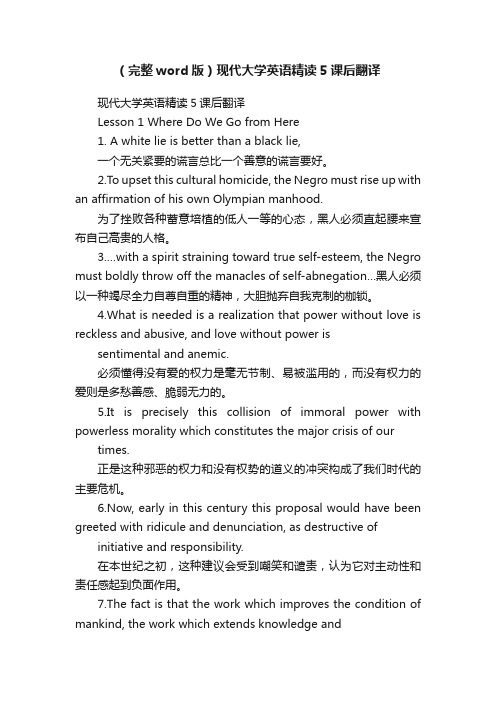
(完整word版)现代大学英语精读5课后翻译现代大学英语精读5课后翻译Lesson 1 Where Do We Go from Here1. A white lie is better than a black lie,一个无关紧要的谎言总比一个善意的谎言要好。
2.To upset this cultural homicide, the Negro must rise up with an affirmation of his own Olympian manhood.为了挫败各种蓄意培植的低人一等的心态,黑人必须直起腰来宣布自己高贵的人格。
3.…with a spirit straining toward true self-esteem, the Negro must boldly throw off the manacles of self-abnegation…黑人必须以一种竭尽全力自尊自重的精神,大胆抛弃自我克制的枷锁。
4.What is needed is a realization that power without love is reckless and abusive, and love without power issentimental and anemic.必须懂得没有爱的权力是毫无节制、易被滥用的,而没有权力的爱则是多愁善感、脆弱无力的。
5.It is precisely this collision of immoral power with powerless morality which constitutes the major crisis of our times.正是这种邪恶的权力和没有权势的道义的冲突构成了我们时代的主要危机。
6.Now, early in this century this proposal would have been greeted with ridicule and denunciation, as destructive of initiative and responsibility.在本世纪之初,这种建议会受到嘲笑和谴责,认为它对主动性和责任感起到负面作用。
大学英语精读第五册课文翻译
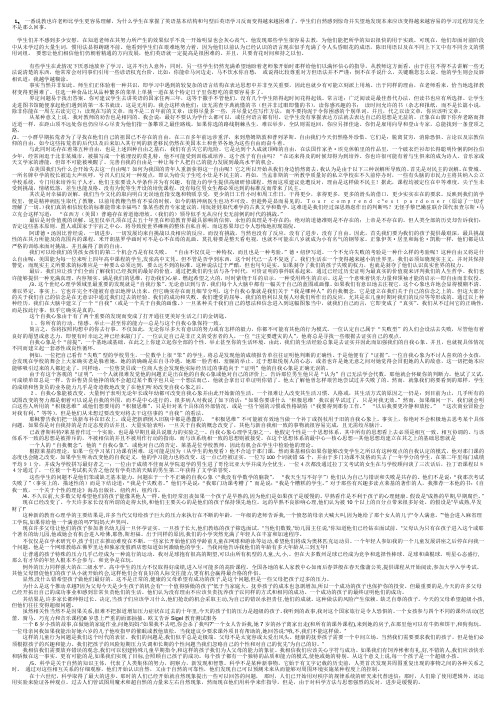
1、一番说教也许老师比学生更容易理解,为什么学生在掌握了英语基本结构和句型后英语学习反而变得越来越困难了。
学生们自然感到惊奇并失望地发现本来应该变得越来越容易的学习过程却完全不是那么回事。
学生们并不感到多少安慰,在知道老师在其努力所产生的效果似乎不及一开始明显也会灰心丧气。
他发现那些学生很容易去教,为他们能把所学的知识很快的用于实践。
可现在,他们却面对前阶段中从未学过的大量生词,惯用法显得踌躇不前。
他看到学生们在艰难地努力着,因为他们以前认为已经认识的语言现在似乎充满了令人头昏眼花的成语,陈旧用语以及在不同上下文中有不同含义的惯用词组。
要想让他们相信他们仍朝着精通的方向发展,他们英语就一定提高是很困难的。
并且,只要肯花时间和持之以恒。
有些学生在此情况下厌恶地放弃了学习,这并不出人意外;同时,另一些学生仍然充满希望地盼着老师象开始时那样给他们以满怀信心的指导。
从教师这方面看,由于往往不得不去讲解一些无法说清楚的东西,他常常会对同事们引用一些谚语权充台阶,比如:你能牵马河边走,马不饮水你自愁,或说得比较尊重对方但语法并不严谨:倒不在乎说什么,关键瞧您怎么说。
他的学生则会反唇相讥道:我越学越糊涂。
事实当然并非如此。
师生们正体验着一种共识,即学习中遇到的较复杂的语言结构在表达思想中并非至关重要,因此也就少有可能立刻派上用场。
出于同样的理由,在老师看来,恰当地选择教材变得更困难了。
任选一种食品比从品种繁多的菜单上单挑一道在某个特定日子里你想吃的菜要容易多了。
界定问题易于找出答案。
你可建议学生去讲英语的国家住两三年,这等于撒手不管他们。
没有几个学生陪得起时间花得起钱。
常言道:广泛阅读是最佳替代办法,但读书也应有所选择。
让学生走进图书馆随便拿起他们遇到的第一本书就读,这是无用的。
我会这样劝他们;读无需查字典就懂的书(但并非过眼即懂的书),读你感兴趣的书;读时间允许的书(杂志和报纸,而不是长篇小说,除非你能在一周左右读完它);读现在写的文章,而不是二百年前的文章;读得尽量多一些,并尽量记住写作方法,而不要拘泥于令你困惑的个别单词。
现代大学英语精读5课后翻译习题答案

Lesson 11. A white lie is better than a black lie.一个无关紧要的谎言总比一个恶意的谎言要好。
2. To upset this cultural homicide, the Negro must rise up with an affirmation of his ownOlympian manhood.为了挫败各种蓄意培植的低人一等的心态,黑人必须直起腰来宣布自己高贵的人格。
3. …with a spirit straining toward t rue self-esteem, the Negro must throw off the manacles ofself-abnegation…黑人必须一种竭尽全力自尊自重的精神,大胆抛弃自我克制的枷锁。
4. What is needed is a realization that power without love is reckless and abusive, and lovewithout power is sentimental and anemic.必须懂得没有爱的权利是毫无节制的、易被滥用的,而没有权利的爱则是多愁善感、脆弱无力的。
5. It is precisely this collision of immoral power with powerless morality which constitutes themajor crisis of our times.正是这种邪恶的权利和没有权势的道义的冲突构成了我们时代的主要危机。
6. Now early in this century this proposal would have been greeted with ridicule anddenunciation, as destructive of initiative and responsibility.在本世纪之初,这种建议会受到嘲笑和谴责,认为它对主动性和责任感其负面作用。
大学英语精读第5册课文全文翻译
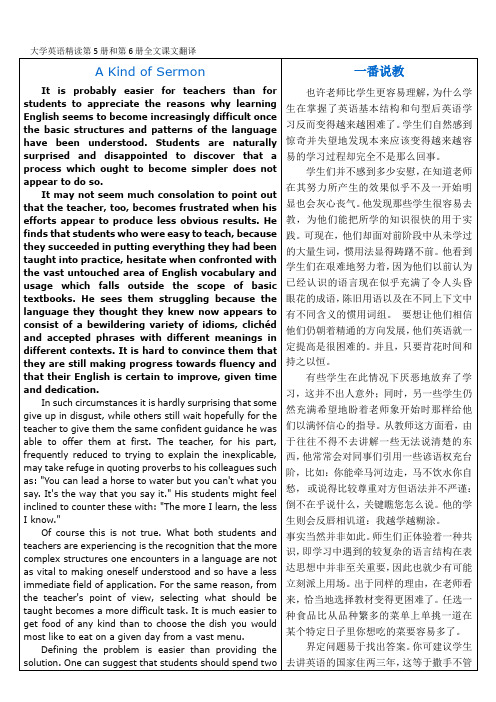
精读5第二版课文翻译
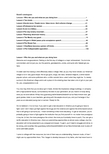
Book5 cataloguesLesson 1Who Are you and what are you doing here (1)Lesson 2 Two kinds (10)Lesson 3Goods move. People move. Ideas move. And cultures change (21)Lesson 4Professions foe women (29)Lesson 5Love is a fallacy (34)Lesson 6The way torainy mountain (47)Lesson 7Rewriting American history (53)Lesson 8 The Merely very good (73)Lesson 9 Al gore’s Nobel peace prize acceptance speech (82)Lesson10The Bluest Eye (89)Lesson 11HowNews becomes opinion off-limits (101)Lesson 12The Indispensable opposition (105)Lesson 1 Who Are you and what are you doing hereWelcome and congratulations: Getting to the first day of college is a major achievement. You’re to be commended, and not just you, but the parents, grandparents, uncles, and aunts who helped get you here.It’s been said that raising a child effectively takes a village: Well, as you may have noticed, our American village is not in very good shape. We’ve go t guns, drugs, two wars, fanatical religions, a slime-based popular culture, and some politicians who—a little restraint here—aren’t what they might be. To merely survive in this American village and to win a place in the entering class has taken a lot of grit on your part. So, yes, congratulations to all.You now may think that you’ve about got it made. Amidst the impressive college buildings, in company with a high-powered faculty, surrounded by the best of your generation, all you need is to keep doing what you’ve done before: W/b436ae4d256db091cd1ac78ea.htmlork hard, get good grades, listen to your teachers, get along with the people around you, and you’ll emerge in four years as an educated young man or woman. Ready for life.Do not believe it. It is not true. If you want to get a real education in America you’re going to have to fight—and I don’t mean just fight against the drugs and the violence and against the slime-based culture that is still going to surround you. I mean som ething a little more disturbing. To get an education, you’re probably going to have to fight against the institution that you find yourself in—no matter how prestigious it may be. (In fact, the more prestigious the school, the more you’ll probably have to push.) You can get a terrific education in America now—there are astonishing opportunities at almost every college—but the education will not be presented to you wrapped and bowed. To get it, you’ll need to struggle and strive, to be strong, and occa/b436ae4d256db091cd1ac78ea.htmlsionally even to piss off some admirable people.I came to college with few resources, but one of them was an understanding, however crude, of how I might use my opportunities there. This I began to develop because of my father, who had never been tocollege—in fact, he’d barely gotten out of high school. One night after dinner, he and I were sitting in our kitchen at 58 Clewley Road in Medford, Massachusetts, hatching plans about the rest of my life. Iwas about to go off to college, a feat no one in my family had accomplished in living memory. “I think I might want to be pre-law,” I told my father. I had no idea what being pre-law was. My father compressed his brow and blew twin streams of smoke, dragon-lik e, from his magnificent nose. “Do you want to be a lawyer?” he asked. My father had some experience with lawyers, and with policemen, too; he was not well-disposed toward either. “I’m not really sure,” I toldh/b436ae4d256db091cd1ac78ea.htmlim, “but lawyers make pretty good money, right?”My father detonated. (That was not uncommon. My father detonated a lot.) He told me that I was going to go to college only once, and that while I was there I had better study what I wanted. He said that when rich kids went to school, they majored in the subjects that interested them, and that my younger brother Philip and I were as good as any rich kids. (We were rich kids minus the money.) Wasn’t I interested in literature? I confessed that I was. Then I had better study literature, unless I had inside information to the effect that reincarnation wasn’t just hype, and I’d be able to attend college thirty or forty times. If I had such info, pre-law would be fine, and maybe even a tour through invertebrate biology could also be tossed in. But until I had the reincarnation stuff from a solid source, I better get to work and pick out some English classes from the course catalog./b436ae4d256db091cd1ac78ea.html “How about the science requirements?”“Take ’em later,” he said, “you never know.”My father, Wright AukenheadEdmundson, Malden High School Class of 1948 (by a hair), knew the score. What he told me that evening at the Clewley Road kitchen table was true in itself, and it also contains the germ of an idea about what a university education should be. But apparently almost everyone else—students, teachers, and trustees and parents—sees the matter much differently. They have it wrong.Education has one salient enemy in present-day America, and that enemy is education—university education in particular. To almost everyone, university education is a means to an end. For students, that end is a good job. Students want the credentials that will help them get ahead. They want the certificate that will give them access to Wall Street, or entrance into law or medical or business school. And how can we blame them? /b436ae4d256db091cd1ac78ea.htmlAmerica values power and money, big players with big bucks. When we raise our children, we tell them in multiple ways that what we want most forthem is success—material success. To be poor in America is to be a failure—it’s to be without decent health care, without basic necessities, often without dignity. Then there are those back-breaking student loans—people leave school as servants, indentured to pay massive bills, so that first job better be a good one. Students come to college with the goal of a diploma in mind—what happens in between, especially in classrooms, is often of no deep and determining interest to them.In college, life is elsewhere. Life is at parties, at clubs, in music, with friends, in sports. Life is what celebrities have. The idea that the courses you take should be the primary objective of going to college is tacitly considered absurd. In terms of their work, students live in the futureand/b436ae4d256db091cd1ac78ea.html not the present; they live with their prospects for success. If universities stopped issuing credentials, half of the clients would be gone by tomorrow morning, with the remainder following fast behind.The faculty, too, is often absent: Their real lives are also elsewhere. Like most of their students, they aim to get on. The work they are compelled to do to advance—get tenure, promotion, raises, outside offers—is, broadly speaking, scholarly work. No matter what anyone says this work has precious little to do with the fundamentals of teaching. The proof is that virtually no undergraduate students can read and understand their professors’ scholarly publications. The public senses this disparity and so thinks of the professors’ work as being silly or beside the point. Some of it is. But the public also senses that bec ause professors don’t pay full-bore attention to teaching they don’t have to work very hard—they’ve created /b436ae4d256db091cd1ac78ea.htmla massive feather bed for themselves and called it a university.This is radically false. Ambitious professors, the ones who, like their students, want to get ahead in America, work furiously. Scholarship, even if pretentious and almost unreadable, is nonethelesslabor-intense. One can slave for a year or two on a single article for publication in this or that refereed journal. These essays are honest: Their footnotes reflect real reading, real assimilation, and real dedication. Shoddy work—in which the author cheats, cuts corners, copies from others—is quickly detected. The people who do this work have highly developed intellectual powers, and they push themselves hard to reach a certain standard: That the results have almost nopractical relevance to the students, the public, or even, frequently, to other scholars is a central element in the tragicomedy that is often academia.The students and the profes/b436ae4d256db091cd1ac78ea.htmlsors have made a deal: Neither of them has to throw himself heart and soul into what happens in the classroom. The students write their abstract, over-intellectualized essays; the professors grade the students for their capacity to be abstract and over-intellectual—and often genuinely smart. For their essays can be brilliant, in a chilly way; they can also be clipped off the Internet, and often are. Whatever the case, no one wants to invest too much in them—for life is elsewhere. The professor saves his energies for the profession, while the student saves his for friends, social life, volunteer work, making connections, and getting in position to clasp hands on the true grail, the first job.No one in this picture is evil; no one is criminally irresponsible. It’s just that smart people are prone to look into matters to see how they might go about buttering their toast. Then they butter their toast.As for the admin/b436ae4d256db091cd1ac78ea.htmlistrators, their relation to the students often seems based not on love but fear. Administrators fear bad publicity, scandal, and dissatisfaction on the part of their customers. More than anything else, though, they fear lawsuits. Throwing a student out of college, for this or that piece of bad behavior, is very difficult, almost impossible.The student will sue your eyes out. One kid I knew (and rather liked) threatened on his blog to mince his dear and esteemed professor (me) with a samurai sword for the crime of having taught a boring class. (The class was a little boring—I had a damned cold—but the punishment seemed a bit severe.) The dean of students laughed lightly when I suggested that this behavior might be grounds for sending the student on a brief vacation. I was, you might say, discomfited, and showed up to class for a while with my cellphone jiggered to dial 911 with one touch.Still, this was small potatoes. Co/b436ae4d256db091cd1ac78ea.htmllleges are even leery of disciplining guys who have committed sexual assault, or assault plain and simple. Instead of being punished, these guys frequently stay around, strolling the quad and swilling the libations, an affront (and sometimes a terror) to their victims.You’ll find that cheating is common as well. As far as I can discern, the student ethos goes like this: If the professor is so lazy that he gives the same test every year,it’s okay to go ahead a nd take advantage—you’ve both got better things to do. The Internet is amok with services selling term papers and those services exist, capitalism being what it is, because people purchase the papers—lots of them. Fraternity files bulge with old tests from a variety of courses.Periodically the public gets exercised about this situation, and there are articles in the national news. But then interest dwindles and matters go back to normal.On/b436ae4d256db091cd1ac78ea.htmle of the reasons professors sometimes look the other way when they sense cheating is that it sends them into a world of sorrow. A friend of mine had the temerity to detect cheating on the part of a kid who was the nephew of a well-placed official in an Arab government complexly aligned with the U.S. Black limousines pulled up in front of his office and disgorged decorously suited negotiators. Did my pal fold? Nope, he’s not the type. But he did not enjoy the process.What colleges generally want are well-rounded students, civic leaders, people who know what the system demands, how to keep matters light, not push too hard for an education or anything else; people who get their credentials and leave the professors alone to do their brilliant work, so they may rise and enhance the rankings of the university. Such students leave and become donors and so, in their own turn, contribute immeasurably to the university’s standing.T/b436ae4d256db091cd1ac78ea.htmlhey’ve done a fine job skating on surfaces in high school—the best way to get an across-the-board outstanding record—and now they’re on campus to cut a few more figure eights.In a culture where the major and determining values are monetary, what else could you do? How else would you live if not by getting all you can, succeeding all you can, making all you can?The idea that a university education really should have no substantial content, should not be about what John Keats was disposed to call Soul-making, is one that you might think professors and university presidents would be discreet about. Not so. This view informed an address that Richard Brodhead gaveto the senior class at Yale before he departed to become president of Duke. Brodhead, an impressive, articulate man, seems to take as his e ducational touchstone the Duke of Wellington’s precept that the Battle of Waterloo was won on the playing fields ofEto/b436ae4d256db091cd1ac78ea.htmln. Brodhead suggests that the content of the courses isn’t really what matters. In five years (or five months,or minutes), the student is likely to have forgotten how to do the problem sets and will only hazily recollect what happens in the ninth book of Paradise Lost. The legacy of their college years will be a legacy of difficulties overcome. When they face equally arduous tasks later in life, students will tap their old resources of determination, and they’ll win.All right, there’s nothing wrong with this as far as it goes—after all, the student who writes a brilliant forty-page thesis in a hard week has learned more than a little about her inner resources. Maybe it will give her needed confidence in the future. But doesn’t the content of the courses matter at all?On the evidence of this talk, no. Trying to figure out whether the stuff you’re reading is true or false and being open to having your lif/b436ae4d256db091cd1ac78ea.htmle changed is a fraught, controversial activity. Doing so requires energy from the professor—which is better spent on other matters. This kind of perspective-altering teaching and learning can cause the things which administrators fear above all else: trouble, arguments, bad press, etc. After the kid-samurai episode, the chair of my department not unsympathetically suggested that this was the sort of incident that could happen when you brought a certain intensity to teaching. At the time I found his remark a tad detached, but maybe he was right.So, if you want an education, the odds aren’t with you: The professors are off doing what t hey call their own work; the other students, who’ve doped out the way the place runs, are busy leaving the professors alone and getting themselves in position for bright and shining futures; the student-services people are trying to keep everyone content, offering plenty of entertainment andbu/b436ae4d256db091cd1ac78ea.htmlilding another state-of-the-art workout facility every few months. The development office is already scanning you for future donations. The primary function of Yal e University, it’s recently been said, is to create prosperous alumni so as to enrich Yale University.So why make trouble? Why not just go along? Let the profs roam free in the realms of pure thought, let yourselves party in the realms of impure pleasure, and let the student-services gang assert fewer prohibitions and newer delights for you. You’ll get a good job, you’ll have plenty of friends, you’ll have a driveway of your own.You’ll also, if my father and I are right, be truly and righteously screw ed. The reason for this is simple. The quest at the center of a liberal-arts education is not a luxury quest; it’s a necessity quest. If you do not undertake it, you risk leading a life of desperation—maybe quiet, maybe, in time, very loud—and I/b436ae4d256db091cd1ac78ea.htmlam not exaggerating. For you risk trying to be someone other than who you are, which, in the long run, is killing.By the time you come to college, you will have been told who you are numberless times. Your parents and friends, your teachers, your counselors, your priests and rabbis and ministers and imams have all had their say. They’ve let you know how they size you up, and they’ve let you know what they think you should value. They’ve given you a sharp and pro tracted taste of what they feel is good and bad, right and wrong. Much is on their side. They have confronted you with scriptures—holy books that, whatever their actual provenance, have given people what they feel to be wisdom for thousands of years. They’ve given you family traditions—you’ve learned the ways of your tribe and your community. And, too, you’ve been tested, probed, looked at up and down and through. The coach knows what your athletic prospects are, th/b436ae4d256db091cd1ac78ea.htmle guidance office has a sheaf of test scores that relegate you to this or that ability quadrant, and your teachers have got you pegged. You are, as Foucault might say, the intersection of many evaluative and potentially determining discourses: you boy, you girl, have been made.And—contra Foucault—that’s not so bad. Embedded in all of the major religions are profound truths. Schopenhauer, who despised belief in transcendent things, nonetheless thought Christianity to be of inexpressible worth. He couldn’t believe in the divinity of Jesus, or in the afterlife, but to Schopenhauer, a deep pessimist, a religion that had as its central emblem the figure of a man being tortured on a cross couldn’t be entirely misleading. To the Christian, Schopenhaue r said, pain was at the center of the understanding of life, and that was just as it should be.One does not need to be as harsh as Schopenhauer to understand the use ofrel/b436ae4d256db091cd1ac78ea.htmligion, even if one does not believe in an otherworldly god. And all of those teachers and counselors and friends—and the prognosticating uncles, the dithering aunts, the fathers and mothers with their hopes for your fulfillment—or theirfulfillment in you—should not necessarily be cast aside or ignored. Families have their wisdom. The question “Who do they think you are at home?” is never an idle one.The major conservative thinkers have always been very serious about what goes by the name of common sense. Edmund Burke saw common sense as a loosely made, but often profound, collective work, in which humanity has deposited its hard-earned wisdom—the precipitate of joy and tears—over time. You have been raised in proximity to common sense, if you’ve been raised at all, and common sense is something to respect, though not quite—peace unto the formidable Burke—to revere.You may be all that the good people who/b436ae4d256db091cd1ac78ea.html raised you say you are; you may want all they have shown you is worth wanting; you may be someone who is truly your father’s son or your mother’s daughter. But then again, you may not be.For the power that is in you, as Emerson suggested, may be new in nature. You may not be the person that your parents take you to be. And—this thought is both more exciting and more dangerous—you may not be the person that you take yourself to be, either. You may not have read yourself aright, and collegeis the place where you can find out whether you have or not. The reason to read Blake and Dickinson and Freud and Dickens is not to become more cultivated, or more articulate, or to be someone who, at a cocktail party, is never embarrassed (or who can embarrass others). The best reason to read them is to see if they may know you better than you know yourself. You may find your own suppressed and rejected thoughts flowing back to you with/b436ae4d256db091cd1ac78ea.html an “alienated majesty.” Reading the great writers, you may have the experience that Longinus associated with the sublime: You feel that you have actually created the text yourself. For somehow your predecessors are more yourself than you are.This was my own experience reading the two writers who have influenced me the most, Sigmund Freud and Ralph Waldo Emerson. They gave words to thoughts and feelings that I had never been able to render myself. They shone a light onto the world and what they saw, suddenly I saw, too. From Emerson I learned to trust my own thoughts, to trust them even when every voice seems to be on the other side. I need the wherewithal, as Emerson did, to say what’s on my mind and to take theinevitable hits. Much more I learned from the sage—about character, about loss, about joy, about writing and its secret sources, but Emerson most centrally preaches the gospel of self-reliance and that is/b436ae4d256db091cd1ac78ea.html what I have tried most to take from him. I continue to hold in mind one of Emerson’s most memorable passages: “Society is a joint-stock company, in which the members agree, for the better securing of his bread to each shareholder, to surrender the liberty and culture of the eater. The virtue in most request is conformity. Self-reliance is its aversion. It loves not realities and creators, but names and customs.”Emerson’s greatness lies not only in showing you how powerful names and customs can be, but also in demonstrating how exhilarating it is to buck them. When he came to Harvard to talk about religion, he shocked the professors and students by challenging the divinity of Jesus and the truth of his miracles. He wasn’t invited back for decades.From Freud I found a great deal to ponder as well. I don’t mean Freud the aspiring scientist, but the Freud who was a speculative essayist and interpreter of the humanc/b436ae4d256db091cd1ac78ea.htmlondition like Emerson. Freud challenges nearly every significant human ideal. He goes after religion. He says that it comes down to the longing for the father. He goes after love. He calls it “the overestimation of the erotic object.” He attacks our desire for charismatic popular leaders. We’re drawn to them because we hunger for absolute authority. He declares that dreams don’t predict the future and that there’s nothing benevolent about them. They’re disguised fulfillments of repressed wishes.Freud has something challenging and provoking to say about virtually every human aspiration. I learned that if I wanted to affirm any consequential ideal, I had to talk my way past Freud. He was—and is—a perpetual challenge and goad.Never has there been a more shrewd and imaginative cartographer of the psyche. His separation of the self into three parts, and his sense of the fraught, anxious, but often negotiablerelations/b436ae4d256db091cd1ac78ea.html among them (negotiable when youcome to the game with a Freudian knowledge), does a great deal to help one navigate experience. (Though sometimes—and this I owe to Emerson—it seems right to let the psyche fall into civil war, accepting barrages of anxiety and grief for this or that good reason.)The battle is to make such writers one’s ow n, to winnow them out and to find their essential truths. We need to see where they fall short and where they exceed the mark, and then to develop them a little, as the ideas themselves, one comes to see, actually developed others. (Both Emerson and Freud live out of Shakespeare—but only a giant can be truly influenced by Shakespeare.) In reading, I continue to look for one thing—to be influenced, to learn something new, to be thrown off my course and onto another, better way.My father knew that he was dissatisfied with life. He knew that none of the descriptions people had for h/b436ae4d256db091cd1ac78ea.htmlim quite fit. He understood that he was always out-of-joint with life as it was. He had talent: My brother and I each got about half the raw ability he possessed and that’s taken us through life well enough. But what to do with that talent—there was the rub for my father. He used to stroll through the house intoning his favorite line from Groucho Marx’s ditty “Whatever it is, I’m against it.” (I recently asked my son, now twenty-one, if he thought I was mistaken in teaching him this particular song when he was six years old. “No!” he said, filling the air with an invisible forest of exclamation points.) But what my father never managed to get was a sense of who he might become. He never had a world of possibilities spread before him, never made sustained contact with the best that had been thought and said. He didn’t get to revise his understanding of himself, figure out what he’d do best that might give the world some profit.:///b436ae4d256db091cd1ac78ea.htmlarMy father was a gruff man, but also a generous one, so that night at the kitchen table at 58 Clewley Road he made an effort to let me have the chance that had been denied to him by both fate and character. He gave me the chance to see what I was all about, and if it proved to be different from him, proved even to be something he didn’t like or entirely comprehend, then he’d deal with it.Right now, if you’re going to get a real education, you may have to be aggressive and assertive.Your professors will give you some fine books to read, and they’ll probably help you understand them. What they won’t do, for reasons that perplex me, is to ask you if the books c ontain truths you could live your lives by. When you read Plato, you’ll probably learn about his metaphysics and his politics and his way of conceiving thesoul. But no one will ask you if his ideas are good enough to believe in. No one will askyo/b436ae4d256db091cd1ac78ea.htmlu, in the words of Emerson’s disciple William James, what their “cash value” might be. No one will suggest that you might use Plato as your bible for a week or a year or longer. No one, in short, will ask you to use Plato to help you change your life.That will be up to you. You must put the question of Plato to yourself. You must ask whether reason should always rule the passions, philosophers should always rule the state, and poets should inevitably be banished from a just commonwealth. You have to ask yourself if wildly expressive music (rock and rapand the rest) deranges the soul in ways that are destructive to its health. You must inquire of yourself if balanced calm is the most desirable human state.Occasionally—for you will need some help in fleshing-out the answers—you may have to prod your professors to see if they take the text at hand—in this case the divine and disturbing Plato—to be true. And you wil/b436ae4d256db091cd1ac78ea.htmll have to be tough if the professor mocks you for uttering a sincere question instead of keeping matters easy for all concerned by staying detached and analytical. (Detached analysis has a place—but, in the end, you’ve got to speak from the heart and pose the question of truth.) You’ll be the one who pesters his teachers. You’ll ask your history teacher about whether there is a design to our history, whether we’re progressing or declining, or whether, in the words of a fine recent play, The History Boys, history’s “just one fuckin’ thing after another.” You’ll be the one who challenges your biology teacher about the intellectual conflict between evolution and creationist thinking. You’ll not only question the statistics teacher about what numbers ca n explain but what they can’t.Because every subject you study is a language and since you may adopt one of these languages as your own, you’ll want to know how to speak itexper/b436ae4d256db091cd1ac78ea.htmltly and also how it fails to deal with those concerns for which it has no adequate words. You’ll be looking into the reach of every metaphor that every discipline offers, and you’ll be trying to see around their corners.The whole business is scary, of course. What if you arrive at college devoted to pre-med, sure that nothing will make you and your family happier than a life as a physician, only to discover that elementary-school teaching is where your heart is?You might learn that you’re not meant to be a doctor at all. Of c ourse, given your intellect and discipline, you can still probably be one. You can pound your round peg through the very square hole of medical school, then go off into the profession. And society will help you. Society has a cornucopia of resources to enc ourage you in doing what society needs done but that you don’t much like doing and are not cut out to do. To ease your grief, society offer/b436ae4d256db091cd1ac78ea.htmls alcohol, television, drugs, divorce, and buying, buying, buyi ng what you don’t need. But all those too have their costs.Education is about finding out what form of work for you is close to being play—work you do so easily that it restores you as you go. Randall Jarrell once said that if he were a rich man, he would pay money to teach poetry to students. (I would, too, for what it’s worth.) In saying that, he (like my father) hinted in the direction of a profound and true theory of learning.。
大学英语精读第5册课文全文翻译

A Kind of Sermon
It is probably easier for teachers than for students to appreciate the reasons why learning English seems to become increasingly difficult once the basic structures and patterns of the language have been understood. Students are naturally surprised and disappointed to discover that a process which ought to become simpler does not appear to do so.
Defining the problem is easier than providing the solution. One can suggest that students should spend two or three years in an English-speaking country, which amounts to washing one's hands of them. Few students have the time or the money to do that. It is often said that wide reading is the time or the money to do that. It is often said that wide reading is the best alternative course of action but even here it is necessary to make some kind of selection. It is no use telling students to go to the library and pick up the first book they come across. My own advice to them would be: "read what you can understand without having to look up words in a dictionary (but not what you can understand at a glance); read what interests you; read what you have time for (magazines and newspapers rather than novels unless you can read the whole novel in a week or so); read the English written today, not 200 years ago; read as much as you can and try to remember the way it was written rather than individual words that puzzled you." And instead of "read", I could just as well say "listen to."
现代大学英语精读5翻译及课后习题答案(5个单元)
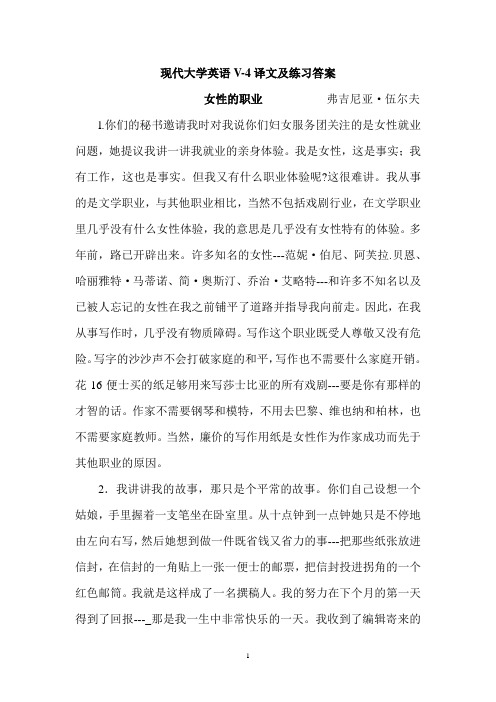
现代大学英语V-4译文及练习答案女性的职业弗吉尼亚·伍尔夫l.你们的秘书邀请我时对我说你们妇女服务团关注的是女性就业问题,她提议我讲一讲我就业的亲身体验。
我是女性,这是事实;我有工作,这也是事实。
但我又有什么职业体验呢?这很难讲。
我从事的是文学职业,与其他职业相比,当然不包括戏剧行业,在文学职业里几乎没有什么女性体验,我的意思是几乎没有女性特有的体验。
多年前,路已开辟出来。
许多知名的女性---范妮·伯尼、阿芙拉.贝恩、哈丽雅特·马蒂诺、简·奥斯汀、乔治·艾略特---和许多不知名以及已被人忘记的女性在我之前铺平了道路并指导我向前走。
因此,在我从事写作时,几乎没有物质障碍。
写作这个职业既受人尊敬又没有危险。
写字的沙沙声不会打破家庭的和平,写作也不需要什么家庭开销。
花16便士买的纸足够用来写莎士比亚的所有戏剧---要是你有那样的才智的话。
作家不需要钢琴和模特,不用去巴黎、维也纳和柏林,也不需要家庭教师。
当然,廉价的写作用纸是女性作为作家成功而先于其他职业的原因。
2.我讲讲我的故事,那只是个平常的故事。
你们自己设想一个姑娘,手里握着一支笔坐在卧室里。
从十点钟到一点钟她只是不停地由左向右写,然后她想到做一件既省钱又省力的事---把那些纸张放进信封,在信封的一角贴上一张一便士的邮票,把信封投进拐角的一个红色邮筒。
我就是这样成了一名撰稿人。
我的努力在下个月的第一天得到了回报---_那是我一生中非常快乐的一天。
我收到了编辑寄来的一封信,里面装有一张一英镑十先令六便士的支票。
为了让你们了解我不值得被称作职业女性,对人生的艰难和奋斗知之甚少,我得承认我没用那笔钱买食物、付房租、买袜子和肉,而是出去买了一只猫,一只漂亮的波斯猫,这只猫不久就引起了我和邻居间的激烈争端。
3.什么会比写文章并用赚得的钱买波斯猫来得更容易?但再想一想,文章得有内容。
我好像记得我的文章是评论一部名人写的小说。
- 1、下载文档前请自行甄别文档内容的完整性,平台不提供额外的编辑、内容补充、找答案等附加服务。
- 2、"仅部分预览"的文档,不可在线预览部分如存在完整性等问题,可反馈申请退款(可完整预览的文档不适用该条件!)。
- 3、如文档侵犯您的权益,请联系客服反馈,我们会尽快为您处理(人工客服工作时间:9:00-18:30)。
现代大学英语5课文译文Lesson10“9. 11”事件前后泰·摩西1.世贸大厦双塔的废墟还在曼哈顿区南端闷燃,微风将几千人的身躯化成的灰烬吹起,一个新的焦虑时代由此开始。
如果有人在9月11日那天像瑞普·凡·温克尔那样恰好睡去,一觉醒来,眼前的这一派景象定让他瞠日结舌。
2.机场里驻进了背着V-16自动步枪的国民警卫队员。
纽约扬基体育场上空的空域因美国总统亲临美国两大职业棒球联赛的决赛而关闭,禁止飞机通过。
体育场的屋顶之上还部署了一排狙击手。
副总统的保卫员们忙不迭地将他不断转移,正如他那难以对付的仇敌奥萨马·本·拉丹一样,据推测他此刻也在世界另一头从一个山洞转移到另一个山洞。
议员们在炭疽病的恐慌中弃岗而逃。
3.“9·11”事件将我们的世界划为截然不同的两个时代。
我们带着惆怅,目送“9·11”之前的世界在怀旧的暗淡色彩中随记忆的小筏渐渐漂走远去。
在我们的记忆中,这个突遭袭击的世界永远如诗如面,牢不可破(虽然实际并非如此)。
谈到它时,我们总是像在谈论亡灵,语气异常恭敬。
4.与此同时,“9·11”之后的日子就像没有标志的荒地呈现在人们面前。
与历史上前几次拓荒一样,这场激烈的精神、政治和物质的资本战正在打响。
前总统比尔·克林顿称这次较量是“争夺21世纪灵魂的战争”,最后的战利品还包括我们最珍视的价值观和自由。
在这场战争中,布什政府的将士们首当其冲,这些视国家安全重于民众自由的官员们准备把他们一贯实行的镇压政策带入未来。
5.不过,光明的一面仍旧存在:越来越多的人开始反对这种多疑和自大,并对这种视安全为国家最高目标的做法提出质疑。
人们开始辩证地思考,对基本上得不到主流媒体重视的和平这一主题热烈讨论。
主流媒体一直以为公众的想法只有红、白、蓝三种颜色,殊不知人们的情感、思想和观点正如美国本身,是多姿多彩的。
6.在2001年11月肯·凯西去世前夕,他以独有的简洁对美国做了这样的描写:“穿西装的人(美国官员)告诉我们穿军装的人(美国军队)怎样对付一味窝藏他人(本·拉丹及“基地”组织成员)的人(塔利班)。
”即将离开人世的人具有的先知使凯西大胆地将这场战争称做仍是历史上一直存在的野蛮的雄性侵略性方式和“或许刚刚处于萌芽阶段的胆怯和脆弱的处理方式”的角逐。
和许多仍旧持这种观点的美国人一样,凯西渴望未来的世界能够建立在互相合作、信任和理智的思考之上。
不再坚不可摧7.纽约和华盛顿遭受的恐怖袭击使美国人不再相信无所不胜这一美国精神的主要特征。
“9·11”事件之后,我们用新眼光对视,并提出新的问题。
如果你乘坐的飞机就要失事,你会用手中的移动电话与谁通话?学者们认为这个国家已经不再纯真,却没有认识到纯真对一个超级大国并不可取。
8.一夜之间,美国感觉到达摩克利斯剑正悬挂在头上,一个接一个以多疑为主调的超现实的插曲出现了:全国抢购防毒面具,邮局辐照所有邮件,严防生物袭击,更让人感到可怕的是专栏上发表的文章,有人扬言,如果再有一名美国人因恐怖分子死亡,美国政府将有理由对穆斯林国家动用核武器。
9.“9·11”事件让我们认识到许多无可争辩的事实,其中有一点就是即使在美国本土也无法保证我们免受伤害。
美国人现在和世界上千百万生活在武装冲突和恐怖活动每天都夺走生命的地区的人们有了更多共同之处。
我们也陷在马斯洛金字塔的底层,为重获安全感而挣扎。
10.这种新的时代精神竟然会让艾丽·麦克比尔这位从不关心政治的人对世界大事也开始担心起来。
艾丽·麦克比尔认为人与人之间的关系“在9月世界变化之前”并非如此困难,对此他感到十分痛惜。
《纽约重案组》中,一个侦探指责另一侦探,说他并不是“世贸大厦事件惟一的受害者”。
11.我们这种巨大的心理创伤最明显的症状就是一种新的狂热的爱国主义。
为了寻求安慰,全国上下都裹进了国旗,就像一个披着超人斗篷扮无敌英雄的小孩子。
家里、各种交通工具上、衣服上、商店的橱窗里、广告牌上、电视广告里……星条旗处处可见。
以前除了在7月4日之外不会想到国旗的人现在一下子都充满激情地成了爱国者。
对我们某些人来说,爱国主义是个复杂的东西,与是否忠于宪法有关。
可是现在,无处不在的国旗可能象征着美国的自豪和统一,有时看上去未免像是对受伤的自我的过度补偿。
国旗不过是个象征,它能够给人提供的保护不会与带有耐克品牌标志的商品有多大差异。
观点的硬化12.人们曾一度不再认为奥韦尔的小说《1984》是一部预言,不过小说巾的描写与我们“9·1l”事件之后这不再完整的时代的确大有相似之处。
他描写反面乌托邦时说,“一些长期以来已经放弃不用的做法,有些甚至几百年来都已废除的做法,例如未经审讯即监禁……公开处决、严刑拷打逼供……不仅又普遍实行起来,而且也为那些自认为开明进步的人所容忍,甚至辩护。
”奥韦尔认为这种突发的社会变化起源于“普遍硬化的观点”。
13.如今的美国将这种观点的硬化称为反恐战。
14.在最前线,国家的新护卫们正制定作战目标、作战方法并进行心理准备。
不过,我们许多人是用公民的自由来定义个人安全和民族性的,而这些自由现在在国家安全的名义下不得不做出让步。
我们现在正在放弃的可能会远远超过“9·1l”事件从我们身边带走的。
15.比如,在恐怖事件后的几周内,司法部未经审判便秘密逮捕了许多年轻的阿拉伯人和穆斯林教徒。
不公布他们的名字,也不允许他们通知其家人。
他们就此消失。
乔治城大学法学教授戴维·科尔将其称为“失踪惯例”。
我们往往认为这种惯例会出现在实行镇压政策的国家,不会出现在分享民主制的国家。
这不仅会减少国人对我国的公正的信心而且一定会在国际上影响美国的可信度。
如果我们无法再坚持我们的理想和价值观,无法坚持我们在过去一直号召其他国家遵守的准则,那么我们就会对自己的身份这一基本的假定产生怀疑。
我们一定要买到底?16.一位正统派犹太教教士曾经和我说过要未雨绸缪。
这位教士谈的虽是人际关系,但这句名言也非常适合当今的地缘政治情况。
也就是说,让我们看看这个日耗油达2000万桶的离不开石油的国家。
这个国家正在走入萧条,刚刚对给他提供大部分油料的地区宣战。
难道减少对石油的消耗不是明智又爱国的举动吗?17.可是,运动型多用途车和耗油量大得惊人的油老虎的销量却一直在上升,预计将首次超过小客车的销量。
汽车制造商对这一爱国行为异常兴奋。
“商家和消费者应该携手为树立全国人民的信心、保持经济发展做出努力,”通用公司副总裁比尔·洛夫乔伊对运动型多用途车的预计销量将达到350万辆充满信心。
18.恐怖袭击刚刚过去,美国人在朋友和邻居身上看到了他们自己的痛苦、恐惧和忧虑,人们将目光又重新投向了社区。
一度泛滥的物质主义和随之而来的可怕的孤独感和强迫症曾经让社区从这个国家的人们心中消失。
社区比不上大购物中心,比不上200多个卫星电视频道,比不了电子游戏,也比不了70小时的工作周。
社区需要人们走出家门,欢聚畅谈,放声高歌,互问互答,辩论输赢。
它是一个市场,而思想和创新就是用来完成交换的中介。
19.可是,既然我们的经济的存在取决于大众消费,很快,政府和大工商企业就杜撰出了一个“经济爱国主义”的概念。
这个弗兰肯斯坦式的概念主张消费是美国价值观,认为美元会让人忘掉一切忧愁。
实际上,这是在阻碍人们进行理性的反思,而在此时这种反思又是十分重要的。
布什总统号召人们将工作和生活恢复正常,他认为我们希望尽快地重建以前的世界。
不过,不是人人都乐于保持沉默.买个不停。
“9.11”之前的世界一去不复返,不管是信用卡还是新汽车都换不回。
我们当中有好多人希望加入到这个刚刚显示出生命力的社区中来。
许多担心经济恶化的公民都拒绝无节制的消费,而且正在寻找措施,以便使我国更加自给自足,并且随时准备应付今后会出现的艰难时刻。
历史的教训20.一个未留下姓名的救援人员,在世贸大厦的废墟中救援时,说他无法向家人描述爆炸中心地带的情况。
每次要开口时,他都发现自己无话可说。
一群自杀性的恐怖分子用几把开箱刀。
就可以让高楼倒塌,几千人的生命一下子消失,这样的事情没有先例,无法类比。
“9·11”就是“9·11”。
21.的确可以说,“9·11”事件是我们时代的危机,也是我们国家的爆发点,但它在历史上并非绝无仅有。
这不是现代社会巾强大的外部力量对人类的第一次打击,这种力量也不是第一次被定义为邪恶。
每一次危机似乎都产生了一种新模式,使这种暴行不会重演----可是暴行再一次出现。
1941年,两天之内共有34,000无辜的犹太人在巴比谷惨遭杀害。
在广岛,仅一天就有13万人丧生。
仅隔三天,在长崎.又有75,OOO人失去生命。
22.对这一切,我们要正视。
历史就像一个画廊,让人们看到了罄竹难书的各种恶行。
在这里,人们看到在一座海滨城市上空升起的蘑菇云,一个皮肤被烧焦的女人,一副骨架紧紧拥抱着一个小孩子大小的骨架,一架斜插过摩天大楼的飞机以及正在倒塌的摩天大楼。
不知姓名的男男女女手拉手从世贸大厦的顶层坠下,奔向死亡。
历史会像记住庞贝古城废墟中的恋人一样记住他们。
我们把这些看作是梦魇花园中的毒花,常着魔似的想起它们,冥思苦想其中的含义。
广岛、巴比谷、德累斯顿和安提坦留给我们什么启示?“9·11”事件又告诉我们什么?23.答案可能就是:我们的痛苦不是惟一的痛苦;我们还没有完全摆脱痛苦;追求和平仍是我们最高尚的事业。
真正的勇气24.“组成一个国家的人民有多强大,这个国家就有多强大,人民希望周家如何发展,国家就会如何发展,”詹姆斯·鲍德温写道。
“我们让我们现在居住的世界成了这个样子,我们有必要重建这个世界。
”25.我们怎样才能不再焦虑,行动起来?怎样才能不冉恐慌,充满自信?全国上下怎样才能不再多疑.人人都安定下来?我们的民主果真如此不堪一击,225年的自由就这样被四个飞机炸弹毁掉?再明显不过.只有世界其他人民真正拥有永久和平时我们才会拥有和平。
这就是这次冲突带给人们的挑战,也是一场保卫21世纪灵魂的斗争。
26.9月11日的早晨是个美丽的早晨,阳光明媚。
一个人----普通的美国人----用移动电话拨通了妻子的电话。
“我们都不会活下来,”当联合航空公司93号航班在宾夕法尼亚郊外上空倾斜时托马斯·伯内特说,“但是我们当中会有人还击的。
”我们只知道托马斯·伯内特后来死得很恐怖。
他和同机的乘客没有因绝望的恐惧止步不前----这才是真正的勇气。
27.93号航班上发生的一切成为这个国家反对恐怖主义的第一个真正胜利,民主传统功不可没。
机上乘客想出一个办法,并且投票决定。
有的乘客要冲向劫匪,让飞机就地坠毁,使劫匪让华盛顿特区成为自杀性袭击目标的计划没有得逞。
